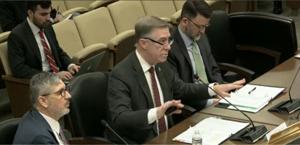(The Center Square) – Tennessee’s revenues for March were $33.3 million less than the budgeted estimates, according to Department of Finance and Administration Commissioner Jim Bryson.
The $1.6 billion in collections is $69.3 million less than March 2024.
“Sales tax receipts, which reflect February’s consumer activity, were likely impacted by adverse weather conditions,” Bryson said. “Corporate tax collections came in slightly below target but remained largely in line with expectations.”
Fuel taxes exceeded budget expectations, increasing by $9.1 million, a 10.39% jump.
Corporate collections are down 13.9% when compared to March 2024, a difference of $44 million. Corporate tax revenues year-to-date are 9.65% below estimates and down 22% when compared to August 2023 to March 2024 numbers. The General Assembly passed a corporate franchise tax cut in 2024 that was estimated to cost the state $1.6 billion. Corporations started applying for the tax break in May 2024.
Bryson reported a decline of $35.4 million in general fund revenues for March.
“Although we fell short of our monthly target, year-to-date revenues remain just below forecast,” Bryson said. “We will continue to closely monitor economic indicators and revenue trends to maintain fiscal stability.”
March is the eighth month of the fiscal year 2024-2025 budget.
The General Assembly passed the $59.8 billion budget for fiscal year 2025-2026 earlier this week, which does not include any tax breaks.
Lawmakers from both parties raised concerns about possible federal budget cuts that could affect Tennessee. Sen. Bo Watson, R-Hixson, said when the budget process began in February that the state was already seeing a freeze in some programs.
House and Senate Democrats sent a letter to Bryson this week asking for more details on federal budget cuts.















































